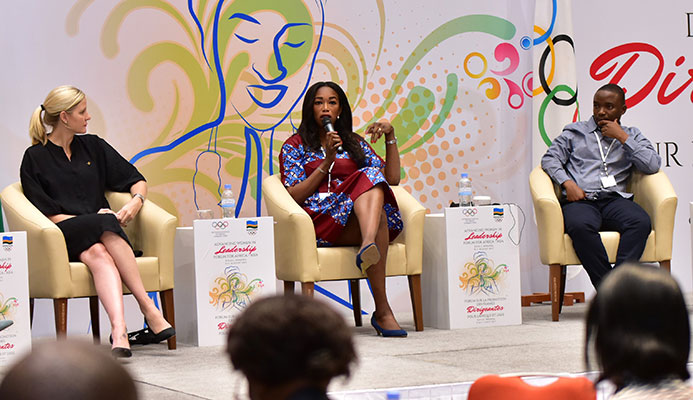Olympic basketball player Kady Kanoute Tounkara urges more women in sport to seek leadership roles
As co-captain of the Mali basketball team that won the FIBA Africa Championship for Women in 2007 and played at the Olympic Games Beijing 2008, Kady Kanoute Tounkara knows what it takes to be a successful leader.
Since retiring from sport, she has also taken a leading role in representing and empowering athletes in Africa as the Zone 2 President of the Association of National Olympic Committees of Africa (ANOCA) Athletes’ Commission.
And now, having recently attended the IOC Advancing Women’s Leadership Roles Forum for Africa and Asia, which took place in Kigali, Rwanda, from 9 to 11 August, she is urging more women to seek leadership roles in sports administration.
“My key take-away message from this conference is ‘let’s be more proactive’,” she tells the Olympic Athletes’ Hub. “Let’s rise up and identify future women leaders. Let’s share our experiences. Let’s work on our weaknesses to see where we can go from here and let’s set some concrete actions.”
The IOC forum, which was co-hosted with the Rwanda Olympic Committee, brought together 251 participants from 71 National Olympic Committees (NOCs) across Africa and Asia to discuss ways in which gender equality can be promoted within the Olympic Movement.
“I think it’s important to have this kind of platform for women, especially in Africa,” explains Kanoute Tounkara. “This conference is a great opportunity for us to come together to exchange information and ideas, and learn from the different participants what they are doing in their own countries. At the same time, the forum creates a network of men and women who can work together and achieve great things regarding the advancement of women in sport.”
For the Beijing 2008 Olympian, who played professional basketball for several years in Europe, the sports movement needs to follow the example of the corporate world, where female leaders have proved to have a hugely positive influence.
“It has been proven in the corporate world that women should be included in the decision-making, to improve conditions and to improve the world,” she explains. “I believe that for many years it has been a man’s world and we are going towards the end of that because we are seeing that things are not going so well. In the corporate world, it has been proven that when you have women in your team it brings added value to the company and to the company’s achievements, and I believe it is the same for the sporting world. We are asking women to be more involved in sport, and in the decision-making processes as well. Their voices should be accounted for.”
As an advocate of athletes’ commissions in the Olympic Movement, Kanoute Tounkara also believes that the voices of athletes should be heard more during key decisions and debates.
“We want athletes to take a part in the decision-making because they are the actors of the game,” she says. “They are the heart of the sporting movement and the athletes’ commissions are a major distribution channel through which athletes’ voices can be heard. It’s only through athletes sitting down and sharing what they need on the court that we can improve the sporting world and that we can understand how to help them. So I think for the future of sport, and for better conditions, we need to have the athletes’ voice and athletes taking part in the decision-making process.
“Athletes have skills, incredible transferable skills that are useful not only in the sporting world but in the world in general. They are great champions on the field and they can be great contributors to the sporting world. So it’s very important for them to take part.”
Kanoute Tounkara is certainly playing an important role in making sure athletes – and women – are better represented within the Olympic Movement, and she asserts that she will continue working towards that goal.
“I felt that this is my responsibility and my duty,” she says. “Being an Olympian means that you should be a role model for the community and for your sport. I’m trying step by step to help make a change.”

